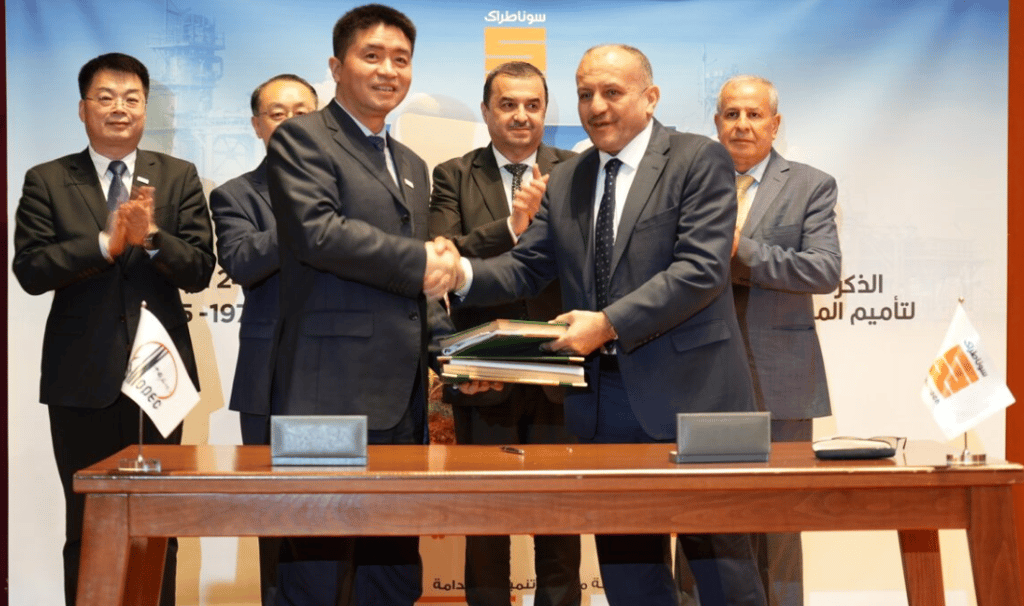Algeria: Expansion of Energy Partnership with China through $850 million deal
As global energy dynamics shift under the weight of geopolitical uncertainty and decarbonisation pressures, Algeria has chosen a clear path: expand output, attract foreign investment, and consolidate its role as a vital hydrocarbon supplier. In this context, is energy independence truly attainable without international entanglement?
ALGERIACHINA
Yanis Madani
4/4/20252 min read


Algeria’s national oil and gas firm Sonatrach has signed an $850 million hydrocarbon development agreement with Sinopec International Energy Investment (HK) Holding Ltd., a subsidiary of China’s state-owned energy conglomerate. The accord represents not only a major step forward in the Hassi Berkane Nord (HBAN) project, but also a clear signal of Algeria’s continued reliance on strategic partnerships to modernise and expand its energy sector.
The HBAN field lies between Ouargla and El Menia provinces, approximately 80 kilometres from Hassi Messaoud, the country’s largest oil-producing region. Drawing upon existing geological data and established technologies, the project aims to expedite production, reduce exploration costs, and maximise efficiency. Both parties anticipate that economic returns will be achieved more swiftly through the application of proven methods rather than speculative exploration.
The signing ceremony, attended by Algerian Minister of Energy and Mines Mohamed Arkab and the Chinese ambassador to Algeria, Dong Guangli, further underscored the depth of bilateral relations. Sonatrach CEO Rachid Hachichi contextualised the deal within broader negotiations with other global energy majors, including Eni, TotalEnergies, Chevron, and ExxonMobil. He emphasised that the strategy behind this partnership is rooted in a desire to strengthen Algeria’s energy infrastructure, raise output efficiency, and deepen access to global markets.
Algeria remains a cornerstone of global energy supply, holding the tenth-largest proven reserves of natural gas. Hydrocarbons represent approximately 95 percent of its export earnings, with oil and gas serving as the backbone of the national economy. Its strategic location in North Africa, directly linked by pipeline to Spain and Italy, positions it as a key supplier to Europe, covering between 8 and 10 percent of the continent’s natural gas demand.
Sonatrach dominates Algeria’s energy landscape, responsible for 80 percent of national hydrocarbon production. It ranks as the twelfth-largest oil consortium globally and oversees a network of 154 subsidiaries involved in every aspect of the energy value chain. These include upstream exploration, midstream pipeline transport across 3,900 kilometres, and downstream refining into gasoline and petrochemicals. In 2021, Sonatrach recorded $35 billion in export revenue, a 75 percent increase from the previous year, largely due to the rebound in global energy demand following the pandemic.
Major producing fields such as Hassi Messaoud and Hassi R'Mel exemplify the scale of Sonatrach’s operations, generating 440,000 and 180,000 barrels per day, respectively. The firm has also pursued international diversification through concessions in Libya, Mauritania, Peru, Yemen, and Venezuela, while expanding into petrochemicals and seawater desalination.
Sinopec, as China’s second-largest energy enterprise and the world’s largest oil refining company, brings both technical expertise and financial capacity. As a state-owned firm under the supervision of the State-owned Assets Supervision and Administration Commission (SASAC), Sinopec merges centralised control with access to global capital. Its advanced competencies in drilling, refining, and field optimisation make it a suitable partner for Algeria’s ambitions to modernise its energy sector and increase production.
The relationship between Sonatrach and Sinopec is not new. Since 2002, the two have cooperated on projects such as the Zarzaitine oil field, where Sinopec played a key role in improving crude oil recovery rates. The new agreement thus builds upon a foundation of operational experience and institutional familiarity, while also aligning with China’s broader strategy of securing long-term hydrocarbon supplies through overseas investment.
This latest development represents more than an isolated commercial transaction. It reflects Algeria’s intention to remain globally competitive by harnessing foreign expertise and capital, while simultaneously advancing domestic energy objectives. It also confirms China’s continued commitment to securing energy security through targeted partnerships, particularly in regions offering both resource abundance and political alignment.


